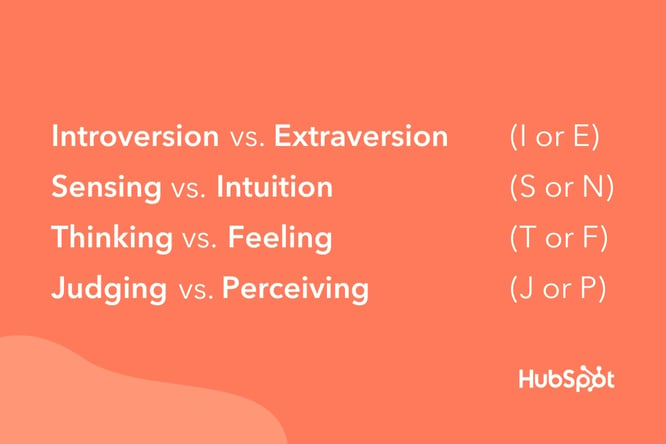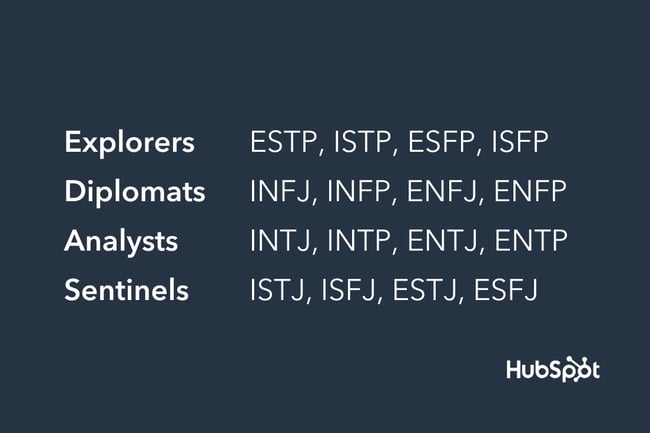While it's true that not everyone is a perfect fit for sales, most people just need the right motivation and management to thrive. And understanding your team's personality types (as well as those of potential hires) can help you motivate, develop, and train them more effectively.

One of the best ways to approach personality in a concrete way is by using a personality framework such as MBTI (Myers-Briggs Type Indicator).
Sales Personality Types
As a reminder, the Myers-Briggs Type Indicator® identifies 16 personality types that emerge from your preferences. Those preferences are:

Administering the Myers-Briggs test allows you to discover your employee's preferences, and it assigns each of them a four-letter "type" that encompasses their personality.
This type can then be used to understand the individual's motivational factors.
Identifying salespeople's Myers-Briggs personality types is a great place to start when attempting to understand motivational factors. But how do you know which types will thrive in sales?
What personality types succeed in sales?
- ESFJ (The Provider)
- ESTP (The Explorer)
- ENTJ (The Visionary)
- INTJ (The Intellectual)
- ISTP (The Detective)
- INFJ (The Counselor)
- ESTJ (The Commander)
1. ESFJ (The Provider)
ESFJs are compassionate, enthusiastic, and friendly. Due to their Extraversion score, they exude energy when working with people. This helps them maintain the same amount of passion for the work regardless of its ups and downs. In addition, due to the combination of their personality traits, you'll find that ESFJs are motivated to help people (an excellent trait in sales) and adept at communicating and building rapport. All of these factors combined make ESFJs successful in sales roles.
2. ESTP (The Explorer)
ESTPs are personable, practical, and detail-oriented. Because ESTPs think logically, they may have difficulty capitalizing on the whims and handling the objections of particularly emotional prospects. However, ESTPs are observant and pick up on things others might easily miss. They're also truth-seekers, and they are not uncomfortable with getting pushy to make a sale as long as it makes sense for the prospect. With this in mind, ESTPs function best as closers.
3. ENTJ (The Visionary)
ENTJs are talkative, high-achievers who love to explore new ideas. Because they're outcome-oriented and easily able to see the "big picture," ENTJs are great for organizations with long sales cycles and structured sales processes. They're skilled promoters, if a bit intense, who easily take charge of social situations.
4. INTJ (The Intellectual)
INTJ is a less obvious personality type for a sales role due to their Introversion and Thinking traits. INTJs will quickly become drained by too much social interaction, which may sound counter-intuitive in sales.
However, introverts can be deceptively good at sales, particularly in subtler roles with more emphasis on inbound processes than pounding the pavement. INFJs are adept at analysis and logic, so they can excel when creating sales plans, perfecting processes, and spotting tactics that aren't working. They're also great at research, which can make prospecting a breeze.
5. ISTP (The Detective)
Similar to the INTJ, ISTPs are more reserved and find social situations taxing. At the same time, ISTPs are adaptable, self-sufficient, and spontaneous, which are all great traits for fast-paced sales roles. Because they're logical and detail-oriented, they're great "process people" and can excel as sales leaders and managers.
6. INFJ (The Counselor)
For INFJs, the Introversion score is a little misleading. While too much social interaction can be exhausting for them, many INFJs are ambiverts by nature and highly attuned to the emotions and feelings of the people around them.
In addition, INFJs tend to think both creatively and logically, tapping into their "whole brain" when applying skills and completing tasks. These two traits make them empathetic communicators and excellent troubleshooters, which is valuable in many sales roles.
However, INFJs are also passionate about making the world a better place and will become easily drained if there's no altruistic aspect to their work. Many INFJs are energized by ongoing and constant improvement, working hard to impact the lives of those around them, and this makes them excellent at creating structure and processes for the team.
7. ESTJ (The Commander)
If you need a sales rep to come into an already-established process and thrive, the ESTJ is as good a hire as any. Their unique trait combinations make them uniquely able to abide by existing rules and structures. They take direction from leadership well and are self-motivators who hold themselves accountable. At the same time, they're high-energy individuals who thrive on social interaction. ESTJs are detail-oriented, making them great listeners who take action on what prospects say.
Managing and Motivating Salespeople Based on Personality Type
Now that you know more about the Myers-Briggs personality types and how they relate to sales, you can then make sales management decisions based on personality traits.
Because it's not always feasible to create a sales management plan based on each team member's specific profile, I've created a quick cheat sheet to help you manage all the 16 Myers-Briggs personalities like a pro, grouping each type into the following four commonly used buckets:

Explorers
Charming, smart, enthusiastic, and energetic —explorers make some of the best salespeople around. They are social, enjoy being held to challenging metrics, and always find new ways to solve old problems.
To motivate this group, you'll need a variety of strategies. ESTPs require a fun but firm manager. They live on the edge, so enlisting them to participate in high-risk, high-reward sales contests might yield impressive results. ISTPs like to keep things practical. Give them the task of searching for technology that will increase team efficiency and you'll see them rise to the occasion.
A firm schedule is in order for your ESFPs.You can harness their spontaneous nature with a little 9-to-5 rigidity.. And for ISFPs, it's good to be in the details. They're artistic and charming, but might require a goal-oriented strategy to channel that creative energy into sales stats you can both be proud of. For instance, try holding them to activity metrics, like sending a certain number of emails every day or breaking their monthly or quarterly quota into weekly numbers.
Diplomats
"Diplomatic" might not be a word commonly associated with salespeople, but it's crucial to have a few of these personality types on your team. They may seem quiet or overly eager to please (which is not always a good thing in sales), but they're also charismatic and hard-working until the end. In other words, diplomats are the salespeople you want by your side when you're three hours and $10,000 shy of your quarterly sales deadline.
So how do you motivate them? INFJs really appreciate quality time. Try not to miss their weekly check-ins and always ask how they're doing. For INFPs, acknowledgement is key. Did they break a personal record last quarter? Give them kudos at your next all-staff meeting.
Teamwork is an effective way to motivate ENFJs. Enlist them to mentor junior team members so they can teach others their tried-and-true selling tricks. Your ENFPs need a creative outlet every once in a while. Those may be few and far between in the world of sales, but you might consider allowing them to create a piece of sales enablement content for other reps instead of handing that task off to Marketing.
Analysts
Your most curious, bold, innovative, and strategic salespeople fall under the analyst group . They're not satisfied with the processes or explanations your company has relied upon for years, and they love a good challenge.
INTJs do their best work when you, as their manager, outline a path to success. Have lofty goals for revamping your tired CRM workflow this quarter? Assign the task to your INTJ and put together a strategic plan for how they will succeed.
ENTJs are born leaders, so dangling a team mentor or sales management position in front of them is a great way to keep them focused and fulfilled. Oh, and ENTPs would prefer if you didn't beat around the bush. Be open and honest about their performance this quarter, and you'll receive respect and loyalty in return.
Sentinels
This unique group of personalities is here to keep your team grounded. Practical and detail-oriented, sentinels make great managers and caring teammates. To keep them motivated, consider a few of the suggestions below.
Make sure you keep challenging ISTJs. They love solving problems, so let them solve the most pressing ones facing your team or company — for instance, analyzing a decrease in ASP or crafting new positioning against an up-and-coming competitor. ISFJs rely heavily on specificity from their managers. Make sure their quarterly goals are thoroughly outlined and include an actionable path to success.
Speak logically with your ESTJs and you'll be speaking their language. Reorganizing your sales regions? Explain the reasoning to your ESTJ to get them on board first. And be an involved manager with your ESFJs. They're eager to help and will do their best work when you carefully outline their goals and check in regularly to make sure they're aware of and meeting your expectations.
Qualities of Strong Salespeople
Keep in mind that anyone can thrive in sales with the proper motivation and working environment. Think of your own sales team — odds are each person has a different selling style.
That said, the same names may appear at the top of the leaderboard every week. If not for personality, what do the top performers have in common? Chances are they emulate certain qualities that prime them for success.
Here are some of those qualities:
1. Goal-Oriented
It's hard to progress if you don't know which direction you're going. The best salespeople set ambitious — but attainable — goals. They know exactly what they want to accomplish and take the necessary steps to get there.
2. Optimism
Being optimistic is more than wearing a smile during sales calls, meetings, and pitches — it's a mindset that helps great salespeople overcome difficult situations and even rejection. It also influences a variety of other key qualities, like drive, confidence, and perseverance.
3. Ability to Listen and Empathize
A great salesperson doesn't do all the talking. Instead, they show interest, ask thoughtful questions, listen actively, and offer relevant solutions. This builds rapport and trust with both new and current customers.
4. Eager to Learn
The best salespeople commit to learning and growing. For every win or loss, they take a step back to analyze what went right and where they can improve. They also read blogs, listen to podcasts, and stay up to date on trends and recent news in the sales world.
5. Emotional Intelligence
In tough moments, excellent salespeople don't throw a fit or blame others. They recognize and understand their emotions and regulate them during stressful situations. They also use EI to perceive the emotional state of the other party to have a better chance of closing the deal.
Bringing Out the Best in Your Sales Team
You probably didn't hire a team comprised entirely of alpha salespeople. And, let's be honest, that's probably a good thing. What you really need is the skillset to manage each of your salespeople in a way that will bring out the best in each of them and contribute to your company's bottom line.
Editor's note: This post was originally published in July 2017 and has been updated for comprehensiveness.







![[New Data] 7 Actionable Habits of Top Sales Performers](https://blog.hubspot.com/hubfs/habits-top-salespeople%20%281%29.jpg)
![What Type of Salesperson Are You? [Quiz]](https://blog.hubspot.com/hubfs/SELLING%20STYLE%20%281%29.jpg)


